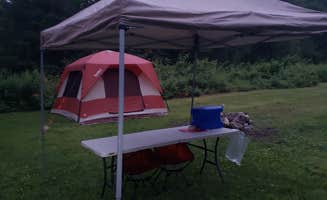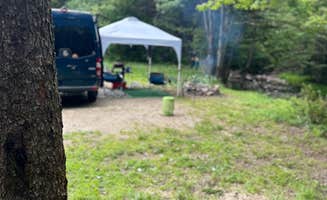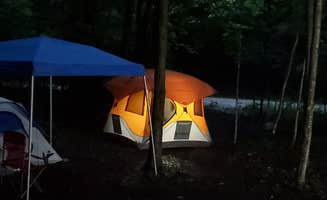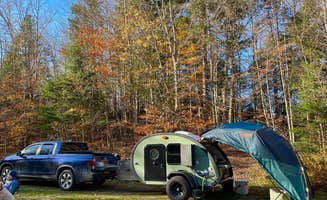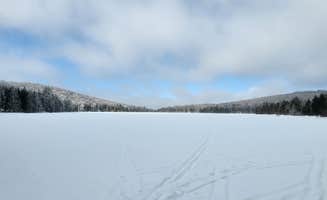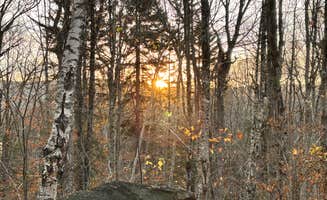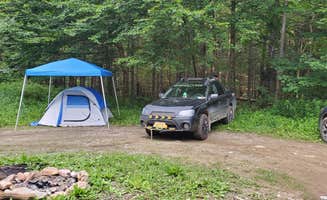Primitive camping near Williamsville, Vermont offers remote outdoor experiences in Green Mountain National Forest. Most sites sit at elevations between 1,800-2,500 feet, creating cooler nighttime temperatures even in summer months. Winter access to many dispersed sites requires snow-appropriate vehicles as forest roads aren't maintained from November through April.
What to do
Trail exploration from campsites: Stratton Pond Shelter provides direct access to multiple trail systems. According to a camper, "The shelter is a 3.75mi hike from the nearest parking lot in winter... at the intersection of AT, LT and Stratton Mountain trail" with "the lake looks great and is one of the largest bodies of water on the Long Trail."
Paddling opportunities: Somerset Airfield offers proximity to excellent water recreation. A visitor notes, "The real attraction is the huge Somerset Resevoir" which provides "plenty of fishing, paddling, hiking and picnicking opportunities."
Winter camping adventures: For cold-weather enthusiasts, Green Mountain National Forest offers challenging but rewarding winter experiences. One camper at Somerset Airfield described, "We endured Snow and mid 20s Friday night with 8" of fresh snow to wake up to Saturday... Saturday evening, we had 3" more by 11pm... temperatures plummeted to 8° and a windchill of-3."
What campers like
Escape from technology: NF 83 - riverside provides a true disconnect from digital life. As one reviewer appreciated, the spot offers "no light pollution, cell signal or distractions" - perfect for those seeking to unplug completely.
Open spaces for group camping: Statton Pond Camp on Forest Road 71 features expansive sites ideal for multiple campers. A visitor described it as "a great site... very flat and could accommodate several small campers" with "easy access to an open circle, capable of handling multiple rigs for a large gathering."
Privacy between sites: NFR 273 Dispersed Camping Spot offers well-spaced camping options. A camper noted there are "at least a dozen spots, some very spacious" with "very few vehicles pass, some days none."
What you should know
Vehicle clearance requirements: Roads to primitive sites often demand appropriate vehicles. At NF83 Dispersed, a camper warns, "Don't expect to get in here unless you have more than 8" of clearance under your vehicle."
Site maintenance varies: Many dispersed sites depend on camper stewardship. At a Forest Road 71 site, one camper reported, "2 years in a row my husband and I had to spend over an hour cleaning the site from the people before us."
Weather preparedness essential: George D Aiken Wilderness Dispersed experiences rapid weather changes. A reviewer noted, "It had rained a lot prior to our arrival, and several sites were damp" while another mentioned "it was getting dark when we arrived and it had been raining all day... some sites were really wet."
Tips for camping with families
Campsite selection: Choose sites with established amenities when bringing children. One camper at George D Aiken Wilderness Dispersed described, "Large, well organized camping spots along the road. The spot I chose had a beautifully built fire pit."
Bug management: Densely wooded sites require extra insect protection. A camper at NFR 273 reported, "A LOT of bugs due to dense wooded surroundings. The bugs seems to be unbothered by the bug spray as well."
Noise considerations: Site locations vary in ambient noise levels. At Hogback Mtn Trailhead, one camper noted it's a "great place to stop for the night" but has "not a lot of ambiance" since it's "at top of paved highway pass."
Tips from RVers
Site access challenges: Many forest roads have seasonal limitations. One RVer at NF 83 riverside observed, "The access into this location is a little rough but most cars should make it, I would prefer having a little more clearance though just to be sure."
Limited facilities: RVers must be self-contained at primitive sites. A Somerset Airfield visitor noted, "No garbage service, no water, no cell service. Basically a camp site where you can share a fire with the neighbors."
Winter preparation: Cold-weather camping requires specific preparation. A winter camper described how "our main Roadhouse down from the weight of the snow. The stakes didn't hold in the frozen ground. So, we tied them to the trees and our cars."


